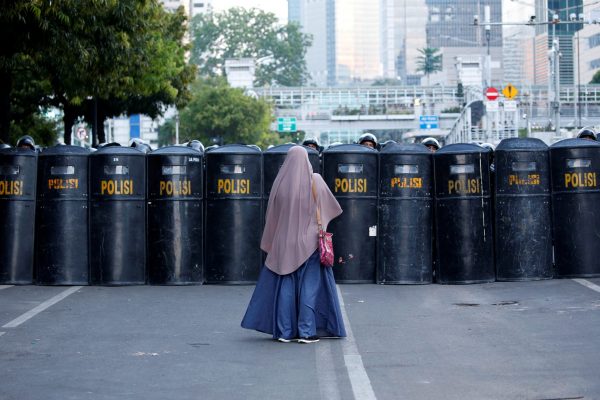Ma’ruf Amin is a spiritual leader of Nahdlatul Ulama (NU), the largest Muslim organisation in Indonesia. But the choice of Ma’ruf Amin has greater political ramifications.
Over his first term, Jokowi faced protests from hard-line Islamic groups for his close relationship with Basuki ‘Ahok’ Tjahaja Purnama, the former governor of Jakarta sentenced to two years prison for religious blasphemy. Jokowi also banned Hizbut Tahrir Indonesia (HTI), a group that supported an Islamic caliphate. Jokowi’s anti-Islam stigma resulted in a swathe of conservative and hard-line Islamic groups giving their support to rival presidential candidate Prabowo Subianto.
A long-standing cultural and theological divergence between moderate traditionalist Islamic groups (Sarungan) and hard-line conservative Islamic groups (Cingkrangan), influenced by Wahhabi–Salafi interpretations, have escalated into the electoral and political domains. The incumbent’s camp associated itself with the Sarungan groups, while in contrast Cingkrangan groups had been drawn by default to Prabowo.
The official result released by the General Election Commission on 21 May 2019 confirmed that President Jokowi won the election with 55.5 per cent of the votes against Prabowo’s 44.5 per cent.
Jokowi’s victory occurred because of his sweeping support among the Sarungan groups of the Muslim community in Central and East Java, while Prabowo performed well in the regions of West Java, Sumatra and Sulawesi where the Islamic discourse is dominated by the Cingkrangan groups. Due to hostilities by Cingkrangan-aligned factions towards minorities in provinces with significant Christian populations such as in North Sumatra, North Sulawesi and eastern Indonesia as well as in Hindu-dominated Bali, Jokowi also gained the majority vote in these regions.
Despite Jokowi’s double-digit landslide victory, Prabowo is claiming ‘massive cheating and irregularities’ and supporters are calling for a so-called ‘people power’ movement. Consequently, Prabowo supporters clashed with security forces in Jakarta. They set fire to a police dormitory and vehicles, eight protestors were killed including three teenagers and over 700 were hurt in the ensuing street violence over 21–22 May 2019.
The outbreak of violence after the release of the official election results has to be understood within the context of growing polarisation in Indonesia’s Muslim society, especially between Sarungan and Cingkrangan groups.
The internet provides an unprecedented breadth of resources in interpreting Islam. The growth of its use among Indonesian Muslims has increased the dissemination of various forms of Islam. Indonesian Muslims now have access to diverse opinions on Islamic thought from numerous and often spurious sources. In the past, Muslims would observe fatwas from Mujtahid, authoritative scholars who exercise independent reasoning (ijtihad) in interpreting Islamic law, either from NU or Muhammadiyah, the second largest Islamic organisation in Indonesia after NU. Now, through the internet, any individual is able to become a freelance Mujtahid. The internet has challenged the rigorous reasoning and established hierarchies of formal Islamic institutions in Indonesia.
Over the past two decades, the use of the internet for religious preaching has been hijacked by hard-line, conservative and often informal Islamic groups. The defining characteristic of these conservative groups is their literal interpretation of Islam. According to Hadith, for instance, Muslim men should wear trousers slightly above the ankle (‘Cingkrangan’).
But by contrast, Sarungan groups emphasise ‘the process’ of reaching fundamental understandings of the Quran. Sarungan groups use the method of ta’wil as the means to harmonise Quranic meaning with their own doctrines, contending that an esoteric or metaphysical understanding of the text proves to be better practice, rather than interpreting it literally.
For Sarungan groups, isbaal (below the ankle garments) is a matter of ijtihad. The majority of scholars agree that it is not forbidden (haram), unless the motivation is borne of arrogance. These Sarungan groups are based on formal Islamic education (pesantren) and are characterised by their wearing of sarongs in daily life, similar to the attire worn by Ma’ruf Amin.
These two groups now dominate Islamic political discourse in Indonesia. The Sarungan groups are known as ardent advocates of Islam Nusantara, a distinctive blend of Islam that has undergone interaction, contextualisation, indigenisation, interpretation and vernacularisation within Indonesia’s socio-cultural milieu.
Islam Nusantara is a product of Islamic theology promoting moderation, compassion, anti-radicalism, inclusiveness and tolerance. On the opposite spectrum are the Cingkrangan groups that emphasise theology inspired by Salafi–Wahhabi fundamentalist movements.
During the 2019 election, Islam in Indonesia experienced commodification, where religion was exploited for political campaign purposes by both sides of the presidential race. The contestation between the Sarungan and Cingkrangan groups during the campaign has now made religion a source of disunity for Muslim society in Indonesia.
The consequence of using religion for campaign purposes, starting with the 2014 election, means that religious identity politics is here to stay, with divisive and debilitating consequences for Indonesia’s future.
Adri Wanto is an Associate Research Fellow of the Indonesia Programme at the S. Rajaratnam School of International Studies (RSIS), Nanyang Technological University (NTU), Singapore.
Associate Professor Leonard C. Sebastian is the Coordinator of the Indonesia Programme at the S. Rajaratnam School of International Studies (RSIS), Nanyang Technological University (NTU), Singapore, and Adjunct Professor at the Institute for Governance and Policy Analysis, the University of Canberra.
A version of this article originally appeared here on RSIS.

